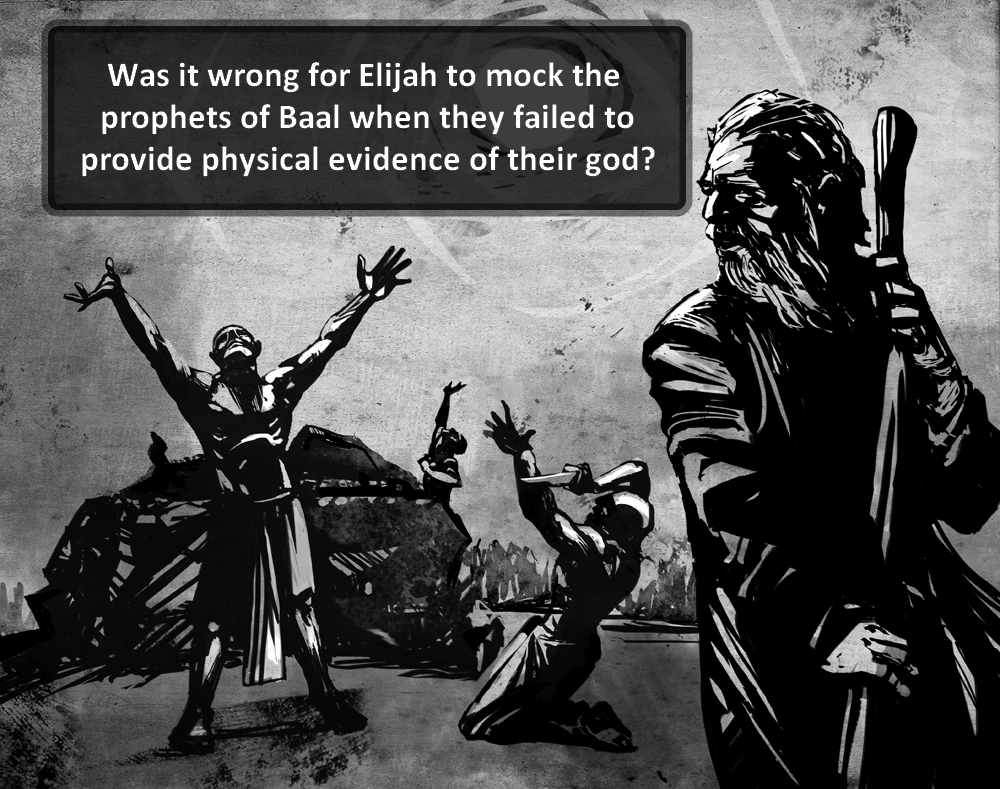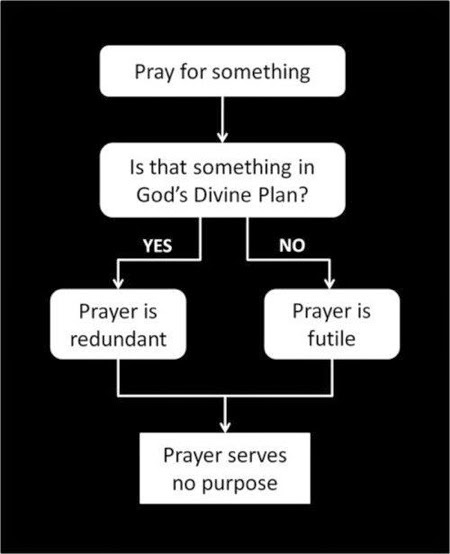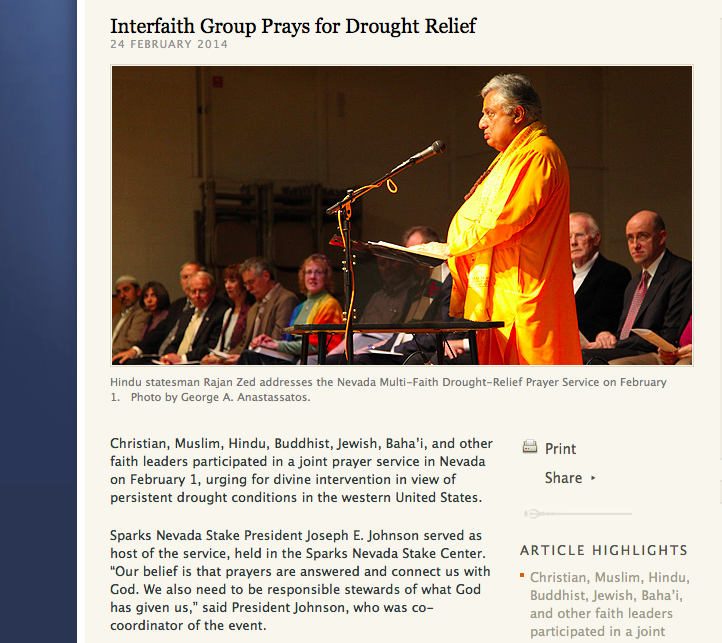“After the Fire a Still Small Voice”
1 Kings 17–19
LDS manual: here
Reading
Elijah and Jezebel
This reading is probably best understood as a conflict between Jezebel and Elijah, representatives of their respective gods. Yes, you’ve heard of Jezebel, the bad girl of the Old Testament, but was she all that bad? Who was she?
Jezebel was a Phoenician princess who married Ahab, king of Israel to the North. (Remember, Israel had split at this point, with the ten tribes to the north, and Judah and Benjamin to the south.) These mixed-faith marriages could be good things, with anthropological mixing and religious pluralism providing some relief from the carnage of religious monoculture. However, Jezebel was influential in promoting the worship of Ba’al, and so the Bible writers — Yahwists that they were — did everything they could to paint her (excuse the pun) as the worst character ever. According to them, she had the prophets of Jehovah killed, not that they wouldn’t have reciprocated.
One thing about Baal: he was a fertility god, and the god of rain. So as our story begins, Elijah shuts up the heavens so it doesn’t rain.
17:1 And Elijah the Tishbite, who was of the inhabitants of Gilead, said unto Ahab, As the LORD God of Israel liveth, before whom I stand, there shall not be dew nor rain these years, but according to my word.
That’s not just petty; it’s to show his superiority over the rain god.
Ravens feed him.
17:6 And the ravens brought him bread and flesh in the morning, and bread and flesh in the evening; and he drank of the brook.
Too bad about all the other people affected by the drought, including a widow and her son. The boy dies, but Elijah brings him back in a rather odd ceremony:
17:17 And it came to pass after these things, that the son of the woman, the mistress of the house, fell sick; and his sickness was so sore, that there was no breath left in him.
17:18 And she said unto Elijah, What have I to do with thee, O thou man of God? art thou come unto me to call my sin to remembrance, and to slay my son?
17:19 And he said unto her, Give me thy son. And he took him out of her bosom, and carried him up into a loft, where he abode, and laid him upon his own bed.
17:20 And he cried unto the LORD, and said, O LORD my God, hast thou also brought evil upon the widow with whom I sojourn, by slaying her son?
17:21 And he stretched himself upon the child three times, and cried unto the LORD, and said, O LORD my God, I pray thee, let this child’s soul come into him again.
17:22 And the LORD heard the voice of Elijah; and the soul of the child came into him again, and he revived.
Chapter 18 is one of my favourites: the head-to-head death match between Jehovah and Baal! On the one side, 450 priests of Baal. On the other, just Elijah. The task: lighting a fire. (It’s like Survivor.)
18:23 Let them therefore give us two bullocks; and let them choose one bullock for themselves, and cut it in pieces, and lay it on wood, and put no fire under: and I will dress the other bullock, and lay it on wood, and put no fire under:
18:24 And call ye on the name of your gods, and I will call on the name of the LORD: and the God that answereth by fire, let him be God. And all the people answered and said, It is well spoken.
The priests of Baal yell, scream, and even cut themselves, but Baal just doesn’t light their fire.
18:25 And Elijah said unto the prophets of Baal, Choose you one bullock for yourselves, and dress it first; for ye are many; and call on the name of your gods, but put no fire under.
18:26 And they took the bullock which was given them, and they dressed it, and called on the name of Baal from morning even until noon, saying, O Baal, hear us. But there was no voice, nor any that answered. And they leaped upon the altar which was made.
Elijah can’t resist taking the piss.
18:27 And it came to pass at noon, that Elijah mocked them, and said, Cry aloud: for he is a god; either he is talking, or he is pursuing, or he is in a journey, or peradventure he sleepeth, and must be awaked.
According to many versions, pursuing means taking a leak. Funny stuff.
There’s one thing I have in common with Elijah, though: Elijah finds it perfectly acceptable to mock the silly religious beliefs of others, and so do I.
18:28 And they cried aloud, and cut themselves after their manner with knives and lancets, till the blood gushed out upon them.
But no dice. Now it’s Elijah’s turn. He wets the wood with water…
18:33 And he put the wood in order, and cut the bullock in pieces, and laid him on the wood, and said, Fill four barrels with water, and pour it on the burnt sacrifice, and on the wood.
18:34 And he said, Do it the second time. And they did it the second time. And he said, Do it the third time. And they did it the third time.
18:35 And the water ran round about the altar; and he filled the trench also with water.
18:36 And it came to pass at the time of the offering of the evening sacrifice, that Elijah the prophet came near, and said, LORD God of Abraham, Isaac, and of Israel, let it be known this day that thou art God in Israel, and that I am thy servant, and that I have done all these things at thy word.
18:37 Hear me, O LORD, hear me, that this people may know that thou art the LORD God, and that thou hast turned their heart back again.
And still — zappo! — fire from heaven.
18:38 Then the fire of the LORD fell, and consumed the burnt sacrifice, and the wood, and the stones, and the dust, and licked up the water that was in the trench.
18:39 And when all the people saw it, they fell on their faces: and they said, The LORD, he is the God; the LORD, he is the God.
With that, Elijah commands that the priests of Baal be killed.
18:40 And Elijah said unto them, Take the prophets of Baal; let not one of them escape. And they took them: and Elijah brought them down to the brook Kishon, and slew them there.
When Jezebel hears that her priests have been murdered, she’s justifiably upset. She tells Elijah he’s going to suffer the same fate.
19:2 Then Jezebel sent a messenger unto Elijah, saying, So let the gods do to me, and more also, if I make not thy life as the life of one of them by to morrow about this time.
Elijah hides out, and gets fed by angels. But the writing’s on the wall for Jezebel. Her death is not part of this lesson, but 2 Kings 9 tells of how Jehu had her thrown out a window, to be ignominiously devoured by hounds.
2 Kings 9:33 And he said, Throw her down. So they threw her down: and some of her blood was sprinkled on the wall, and on the horses: and he trode her under foot.
9:34 And when he was come in, he did eat and drink, and said, Go, see now this cursed woman, and bury her: for she is a king’s daughter.
9:35 And they went to bury her: but they found no more of her than the skull, and the feet, and the palms of her hands.
Jezebel might have been ruthless, but no more so than the Yahwists, who committed far more murders for their god. She’s a character who was made to look worse in the edit.
There are more shenanigans in 1 Kings, of course. The Israelites kill another hundred thousand people.
20:28 And there came a man of God, and spake unto the king of Israel, and said, Thus saith the LORD, Because the Syrians have said, The LORD is God of the hills, but he is not God of the valleys, therefore will I deliver all this great multitude into thine hand, and ye shall know that I am the LORD.
20:29 And they pitched one over against the other seven days. And so it was, that in the seventh day the battle was joined: and the children of Israel slew of the Syrians an hundred thousand footmen in one day.
And 27,000 more get killed when a wall falls on them. How big a wall would this have to be?
20:30 But the rest fled to Aphek, into the city; and there a wall fell upon twenty and seven thousand of the men that were left.
And then there’s this little puzzler. If I were a prophet, and I told you to hit me, would you? Think carefully, because if you get this wrong, you get eaten by a lion. You might say, yes, you’d smite a prophet because you’re supposed to do what the prophet says. But wait: even hitting him? What if you don’t want to hit anyone?
Our first contestant chooses the non-violent option.
20:35 And a certain man of the sons of the prophets said unto his neighbour in the word of the LORD, Smite me, I pray thee. And the man refused to smite him.
BZZT! Wrong answer. Thanks for playing, and now you get eaten by a lion.
20:36 Then said he unto him, Because thou hast not obeyed the voice of the LORD, behold, as soon as thou art departed from me, a lion shall slay thee. And as soon as he was departed from him, a lion found him, and slew him.
The prophet tries it with another guy. This guy gets it right.
20:37 Then he found another man, and said, Smite me, I pray thee. And the man smote him, so that in smiting he wounded him.
20:38 So the prophet departed,
Moral: Give the prophet a beatdown if he’s asking for it.
Main points for this lesson
God doesn’t mind showing up for empirical tests
The story of Elijah and the priests of Baal shows a laudable commitment to empiricism. Far to often, believers make no effort to test their beliefs under controlled conditions, preferring to let confirmation bias work for them instead.
So I always liked the story of Elijah and the priests of Baal. Two altars, one god, see what works. Right?
Except a test isn’t really valid unless it’s replicable, and to my knowledge, no one’s ever tried a repeat. Which tells me that, as with anything that works once and then never again, it’s might be just a big story.
Let’s look at another area: intercessory prayer. Many people believe that people get better faster if you pray for them. Which makes no sense; does God want them to get better or not? Why would he need people to ask him? Is he a bit distracted?
Anyway, there have been some attempts to see whether prayer helps make sick better. These have been double-blind studies where one group of sick people were prayed for, and another group wasn’t.
In the largest study of this kind — a $2.4 million study carried out by the Templeton Foundation — it was found that prayer had no effect on heart disease patients. However, people who knew they were being prayed for had significantly higher complications.
Naturally, the race was on for Christians to explain the failure of prayer. An article in Christianity Today said that, well, God is so awesome that he just helps everyone, prayer or not. Which makes one wonder why one should pray at all.
But many Christians I’ve talked to have explained this result in this way: God doesn’t want to be tested. He does things for his own reasons and in his own way. In other words, the test was double-blind, but it wasn’t triple-blind.
A closely-related rationale is that God refuses to prove he exists. God requires our faith, and leaving clear evidence would thwart his desire for us to believe in him for no good reason whatsoever. Because it’s not true worship unless it’s unmoored from observable reality and careful thinking.
But the story of Elijah and the priests of Baal shows us that this rationale is incorrect. God didn’t seem to mind showing up for a test back then. He was happy to set Elijah’s altar alight in the presence of witnesses. So what’s his problem now? Why does he refuse to heal sick and suffering people just because he knows some scientists might be watching? Why must he operate on the very margins of statistical significance? Unless, again, he’s just a big story.
Sunk-cost fallacy
Even though they’re starving, Elijah gets the widow to feed him first.
17:13 And Elijah said unto her, Fear not; go and do as thou hast said: but make me thereof a little cake first, and bring it unto me, and after make for thee and for thy son.
It’s quite audacious for this old fraud to insist on being served first. However, this is a pattern taken up by the LDS Church, which encourages its members to be financially irresponsible by giving money to it, even if they are unable to meet their other financial commitments.
Your attitude is important in paying tithing. Pay it because you love the Lord and have faith in Him. Pay it willingly with a thankful heart. Pay it first, even when you think you do not have enough money to meet your other needs. Doing so will help you develop greater faith, overcome selfishness, and be more receptive to the Spirit.
And again here:
If paying tithing means that you can’t pay for water or electricity, pay tithing. If paying tithing means that you can’t pay your rent, pay tithing. Even if paying tithing means that you don’t have enough money to feed your family, pay tithing.
And this, even when the church has enormous holdings, builds huge shopping malls, and is not transparent about what it does with the money.
That’s pretty evil for someone to insist on. What’s behind it?
Psychology tells us about the sunk–cost fallacy, which could be formulated:
Your decisions are tainted by the emotional investments you accumulate, and the more you invest in something the harder it becomes to abandon it.
That’s why you might sit through a terrible movie that you’ve paid for, even though you’d have more fun walking out and doing something else.
On a grimmer note, when cult leader Jim Jones induced his followers to commit suicide, he had the children drink the poison first. Why? Once the adults had watched their children die, they would be more likely to follow through and die themselves. They would be all in. What would they then live for?
And so it is with the LDS Church. You are encouraged to give time, money, and effort to the building up of Zion. After an 18–24 month mission, hours spent in meetings, tens of thousands in tithing, and (importantly) saying over and over again from a young age that you know that the church is true, it’s very difficult to then go back on that and say it was all wrong. Leaving would mean the loss of all your contributions, and — in accordance with the sunk-cost fallacy — this is very difficult for our human brains to pull off. This is why investigators are encouraged to start on a path of small but ever-increasing commitments. No one likes to admit that something they’ve done was a waste of time, so the greater the outlay, the tighter the hold.
Additional teaching ideas
Controlling the weather through religion
Controlling the weather is probably one of the earliest uses of applied religion, and it persists today. Check out this item from President Newsroom: Interfaith Group Prays for Drought Relief
Christian, Muslim, Hindu, Buddhist, Jewish, Baha’i, and other faith leaders participated in a joint prayer service in Nevada on February 1, urging for divine intervention in view of persistent drought conditions in the western United States.
Sparks Nevada Stake President Joseph E. Johnson served as host of the service, held in the Sparks Nevada Stake Center. “Our belief is that prayers are answered and connect us with God. We also need to be responsible stewards of what God has given us,” said President Johnson, who was co-coordinator of the event.
Yep, they really think it works.
I remember how, in 2006, the LDS Church joined a similar interfaith effort to end the drought in Australia. They even put out a press release — now pulled, but which still exists on the Wayback Machine.
Needless to say, the drought in Australia continues. But the thing which I always remembered was that no one at church ever mentioned the fast ever again. No one wanted to talk about it! It was a clear sign to me that confirmation bias was an active force in the lives of Latter-day Saints.
The hell’s a Tishbite?
Elijah is described as a Tishbite, but that’s just someone from Tishbe in Gilead, and not someone who goes around biting anyone. On the tish, or anywhere else.
Tishbite is also the name of a Cocteau Twins song, one of the better ones from their last album. That will be our closing hymn.




Recent Comments